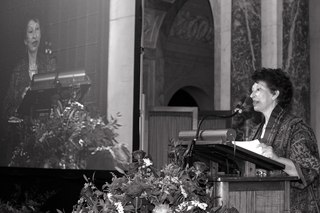A Quote by Leeza Gibbons
I was a middle child and was used to negotiating. But there was nothing I could do to reverse my mothers condition.
Quote Topics
Related Quotes
I think we spend a lot of time denying our mothers. We understand other women earlier than we understand our mothers because we're trying so hard to say, "I'm not going to be like my mother" that we blame her for her condition. If we didn't blame her for her condition, we would have to admit that it could happen to us, too. I spent a long time doing that, thinking that my mother's problems were uniquely her fault.
As important as the father is in the life of a child, even he must take second place to mother during the first three years of life.... Consequently, mothers actually have more to do with producing a predisposition toward homosexuality than fathers. Two kinds of mothers are particularly harmful - smother mothers and dominating mothers.
Most Israelis have a sense, 'We just don't want to live in the Middle East anymore. We don't want it to be the Middle East. Were going to just build a wall or operate unilaterally' - not try to even use force as used to be the case to convince Arabs to accept Israel by convincing them that Israel is here to stay and then negotiating.
I know from my constituency what is going on. Doctors that are told, begged, by mothers, 'Please don't write down that my child as asthma. Please lie and say it's bronchitis, because if you write down asthma, when my child turns 18 or 20 and has to get his or her own insurance, it will be a pre-existing condition.'
Real mothers don't just listen with humble embarrassment to the elderly lady who offers unsolicited advice in the checkout line when a child is throwing a tantrum. We take the child, dump him in the lady's cart, and say, "Great. Maybe you can do a better job." Real mothers know that it's okay to eat cold pizza for breakfast. Real mothers admit it is easier to fail at this job than to succeed.
And, oh God, in my misspent youth as a housewife, I, too, used to bake bread, in those hectic and desolating days just prior to the woman's movement, when middle-class women were supposed to be wonderful wives and mothers, gracious hostesses.... I used to feel so womanly when I was baking my filthy bread.
If in the earlier part of the century, middle-class children suffered from overattentive mothers, from being "mother's only accomplishment," today's children may suffer from an underestimation of their needs. Our idea of what a child needs in each case reflects what parents need. The child's needs are thus a cultural football in an economic and marital game.
Navajo infants get so attached to cradleboard that they cry to be tied into it. Kikuyu infants in Kenya get handed around several"mothers," all wives to one man. . . . Mothers in rural Guatemala keep their infants quiet, in dark huts. Middle-class American mothers talk a blue streak at them. Israeli kibbutz mothers give them over to a communal caretaker . . . Japanese mothers sleep with them. . . . All these tactics are compatible with normal health--physical and mental--and development in infancy. So one lesson for parents so far seems to be: Let a hundred flowers bloom.
I think what Donald Trump is saying to people is that America has way more leverage at the negotiating table than America has used in the past. And whether you like it or not, the government and trade representatives have made the decision not to use that leverage. And it has had an economic impact on the lower and middle class.

































